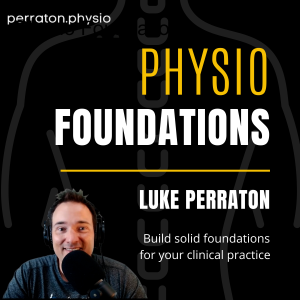
Jess Lindstrom – develop your teaching, learning and research skills, tips for learning at university, teaching during the pandemic and doing a PhD
 2023-04-19
2023-04-19
This week I spoke to Monash University Physiotherapy educator and PhD candidate Jess Lindstrom about her tips for developing your career through education and research, tips for students for learning at university and why you might choose to do a PhD.
If you enjoyed this conversation please share it with a friend or on your social networks. Sharing the episode is the best way to support the podcast and will help us get these positive messages about our profession out to more people around the world.
Thanks for your support of the Physio Foundations podcast as we make our way towards episode 50!
In this episode
0:00 About this episode, welcome Jess
2:00 Jess’ journey through the new grad years leading to physio education – COVID-related disruptions, adaptations, growing and improving
6:40 The specific teaching activities Jess did to build up her CV
8:43 What do you love about anatomy teaching?
11:30 What are the best parts of clinical work? Getting to know people and teaching people how to manage their health
13:32 Are the people who teach in physiotherapy courses dinosaurs? Pushing back on an unfair stereotype, learning goes both ways
17:00 Everyone learns so differently – what works for someone won’t work for someone else
18:23 Good ways to learn and study - learn how to learn, study groups, learn through teaching, the importance of making mistakes, learn in-person whenever possible, don’t try to be perfect
25:38 The value of saying ‘I don’t know’.
26:30 Use the supports that are available for you. Need help, ask
28:38 Jess’ PhD in pelvic health in athletes, and why do you do a PhD?
33:00 Tips for approaching supervisors and starting a PhD, be patient, build your connections and ideas
38:22 Tips for building your research CV. Everyone talks about the importance of saying no, but make time and space so you have the opportunity to say yes.
50:29 Saying ‘I don’t know’ is a sign of an expert (provided you have a plan for finding out the answer)
43:00 What are the most important foundational knowledge and skills for practitioners? Wanting to connect with people, listening, making the space to listen to people. Knowledge of your own skills and limitations, you don’t need to know it all, but you need to have processes for learning
47:55 How well do you need to know anatomy?
52:17 Final thoughts? Have a go. Put your hand up, say yes to things, try things you may not be successful in
This is a discussion aimed at health professionals and health professional students. Always seek the guidance of a qualified health professional with any questions you may have regarding your health or a medical condition.
Subscribe to our YouTube channel: https://www.youtube.com/@PerratonPhysio
Join the conversation on social media @PerratonPhysio
For a list of episodes, transcripts and associated blogs, visit www.perraton.physio/physiofoundations
Follow @PerratonPhysio on Facebook, Twitter, Instagram and Linked In.
Do you have a topic you would like me to cover on the podcast? Email me: luke@perraton.physio, or DM me on Twitter @lukeperraton
Always seek the guidance of a qualified health professional with any questions you may have regarding your health or a medical condition.
More Episodes
 2024-10-16
2024-10-16
 148
148
 2024-05-21
2024-05-21
 188
188
 2023-11-20
2023-11-20
 291
291
Create your
podcast in
minutes
- Full-featured podcast site
- Unlimited storage and bandwidth
- Comprehensive podcast stats
- Distribute to Apple Podcasts, Spotify, and more
- Make money with your podcast
It is Free
- Privacy Policy
- Cookie Policy
- Terms of Use
- Consent Preferences
- Copyright © 2015-2024 Podbean.com




